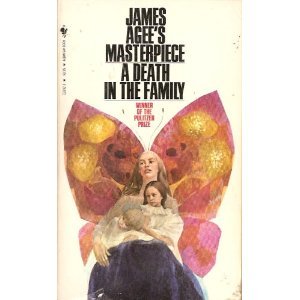A Death in the Family - James Agee

If you haven't read James Agee's masterpiece A death in the Family, you must. It's a brilliant account of grief and loss told from an omniscient POV in prose that takes your breath away.
For example, here's what I found fairly late in the novel:
"Without either desiring to see her face, or caring how it looked, she saw that it had changed; through the deep, clear veil her gray eyes watched her gray eyes watch her through the deep, clear veil."
The entire novel is full of sentences that simply astonish you. Agee, deeply influenced by William Faulkner, cannot help but attempt to surpass the master. Amazingly, Agee still manages to sound original while employing much of Faulkner's style.
Here's what I love about this sentence: It begins negatively, "without," in an existential "either/or" mode which, as you remember from Kierkegaard, posits how a choice, silent and ineffable, must be made to secure identity, meaning. Here the subject of the sentence, Mary, who has just lost her husband, must attend his funeral. She no longer cares for her vanity, because the man in whose direction she launched her vanity (her husband Jay) is dead. Agee doesn't have to say, "Jay's death changed her," or something blunt and obvious as that, he puts those thoughts as physical action for us to see it: "she saw it had changed." Mary has neither desire nor care. The essence of her femininity is and her mothering have vanished.

The semi-colon that splits the sentence in two parts is an artful use of punctuation, as it show the split between Mary and Jay, Mary's past and present, Mary's tortured circularity of having the world spin around her, reliving the night Jay left, and reliving the events of his death as told to her. Incidentally, in describing Jay's death in an auto accident Agee has the car Jay was driving landing upside down, its wheels spinning; it's a crucial image that returns again and again through revolving, spinning, rotating imagery in various ways throughout the novel. But Agee's true victory over language, image, emotion and idea, occurs in the second half of the sentence, utilizing repetition, inverted syntax, and alliteration.
We have "veil" and "gray " which rhyme internally, but anchoring the sentence is the word "watched," sitting dead center; it has the surprising effect of watching the reader. As readers we eavesdrop on the lives of characters and this sentence has the marvelous ability to eavesdrop on us. It also shows us that Mary is regarding herself as an object, "the grieving widow," perhaps, "the suffering woman." It is this level of detachment from the events of facing her dead husband's body that feels like a necessary reaction. She must detach. She must, but alas (further down the page) we see that as much as she might want to try and be distant, her body won't let her.
If you've read the book, then put it on your list of to read again. It has so many gifts of language and insight. So much heartbreak. So much love and hurt, understanding and compassion.
Here are a few other tastes from the novel:
"Their little sounds, as they approached their father, vanished upon it like the infinitesimal whisperings of snow, falling on open water."
"Her mother's arm came round him; he felt her hand on the crest of his shoulder. He slid his arm around her and felt her hand become alive on his shoulder and felt his sister's arm. He touched her bare arm tenderly, and felt her hand grapple for and take his arm. He put his hand around her arm and felt how little it was he could feel a vein beating against the bone, just below her armpit."
"He spoke as if all that he said were in every idea and in every syllable final, finished, perfected beyond disquisition long before he was born; and truth and eternity dwelt like clearest water in the rhythms of his languafe and in the contours of his voice; his voice accepted and bore this language like the bed of a brook."

Comments
Post a Comment